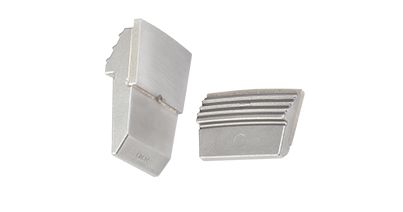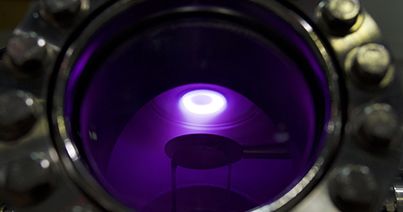
Enhance your substrate with a sleek and smooth metal coating! Evaporator boats are essential for precision, control, and minimizing contamination during deposition. Explore how the metallizing process works in relation to evaporator boats and get some top tips for success.
What are Evaporator Boats?
Evaporator boats are crucibles made from materials such as Titanium Diboride (TiB₂), Boron Nitride (BN). The high thermal resistance of the evaporator boat material allows them to withstand the extreme temperatures of the evaporation process, typically around 1500°C -1600°C (2732°F - 2912°F). In order to process metals like Aluminum, Silver or Copper in a vacuum chamber to create a thin metal coating, evaporator boats feature a specific electrical conductivity and resist thermal shock.
What is Metallizing?
Metallizing, also known as vacuum metallizing, creates a uniform coating on polymer films, paper and other substrates. The process involves preparing the substrate, melting and evaporating the metal. Depending on the application the desired purpose of the coating can be decorative as well as create a barrier or a conductive layer.

A bag making machine
Top Tips for Successful Metallizing
Intermetallic composites (IMC) combine electrical properties, thermal shock resistance and chemical inertness against liquid metals superior to other ceramics, making them the preferred material for metal evaporation. A successful process, however, takes a few more aspects to be considered.
Key Highlights
- Select evaporator boats made from materials for your specific application needs. For instance, ceramics are excellent for high-temperature processes. A vacuum chamber, clean and free from contaminants, ensures a high quality of the coating.
- Overheating the boat surface must be avoided as this can result in an uneven coating. Automation of the temperature is recommended.
- Use boats with designs that maximize the wettable area and ensure uniform heating. This helps in achieving a uniform coating.

Automated packaging machine
Optimizing Your Evaporator Boat Life Span
The lifetime of ceramic boats in the metallization processes can be affected by operating temperature. Higher operating temperatures accelerate corrosion and, as a consequence, the decrease of the evaporator boat’s resistivity. For optimum performance and a longer lifetime, the evaporator boats should be operated at the lowest possible temperature.
High electric power or low wire feed rate reduces the wetted surface area, leading to high thermal stress, material corrosion, or cracking. To avoid overheating, adjust the voltage to reduce electrical power, ensure proper cooling, and maximize the wetted surface area to achieve optimal evaporation rates and lower temperatures.
Evaporator Boat Procedure Check List:
- Make sure the alignment and smoothness of your copper clamps are correct.
- Use graphite tape for uniform electrical and thermal conductivity.
- Use pieces of aluminum wire for the initial heat-up to determine the correct starting temperature.
- Adjust the wire feed to the central position on the boat’s surface.
- Follow the heat-up cycle to ensure the reannealing of the boats during the first heat-up (approximately 12-14 minutes).
- Start the wire at 75% of the normal feed rate and reduce power to achieve maximum wetting over the length of the cavity.
- Begin metallizing and gradually increase the wire feed rate over the first 15 minutes of production.
- Upon completion of the coating.
- Stop the wire.
- Stop power 20-30 seconds later.
- Wait approximately 2 minutes before releasing the vacuum to ensure the boats have cooled below red heat.



Standard T-VAP Evaporator Boat, T-VAP Max Evaporator Boat, and T-VAP Select Evaporator Boat
Kennametal Ceramic Evaporator Boats
Kennametal Sintec is a leader in engineering and specializes in evaporator boats. Our innovations will bring your metallization process to the highest level:
T-VAP Evaporator Boat
- Maximizes surface evaporation and provides a uniform temperature profile
- Consumes less power
- Increases yield of Aluminum to the substrate
T-VAP MAX Evaporator Boat
- Significantly extends boat life
- Prevents metal overflow and lessens spitting
- Enables peak surface evaporation and temperature uniformity
- Uses less power while increasing aluminum yields
T-VAP Select Evaporator Boat
- Delivers quality wettability for high evaporation rates and faster startups
- Consumes less power and increases yield of aluminum to the substrate
- Facilitates temperature uniformity for ease of use
- Provides operators with a visual indication for initial temperature adjustment
Standard Evaporator Boat
- All-purpose ceramic evaporator boat
- Features a sturdy design for long-term stability
- Deploys in vacuum chambers with side or end clamping
Kennametal provides a complete range of evaporator boats for your metallizing needs. For more information, contact a Kennametal expert for insights and recommendations. You can also find more information here.
Summary
By understanding the role of evaporator boats and following these tips, you can achieve high-quality metalized coatings and avoid common challenges in the process.
Related Articles
- Advanced Ceramics in Semiconductor Manufacturing: The Rise of Boron Nitride SolutionsThis article delves into the role of machinable ceramics and ceramic powders/coatings in semiconductor manufacturing. Read more.This article delves into the role of machinable ceramics and ceramic powders/coatings in semiconductor manufacturing. Read more.
- Explore the Advantages of Silicon Nitride and Sialon CeramicsDiscover the fascinating world of silicon nitride and sialon ceramics. Explore how they make an impact in advanced materials engineering.Discover the fascinating world of silicon nitride and sialon ceramics. Explore how they make an impact in advanced materials engineering.

